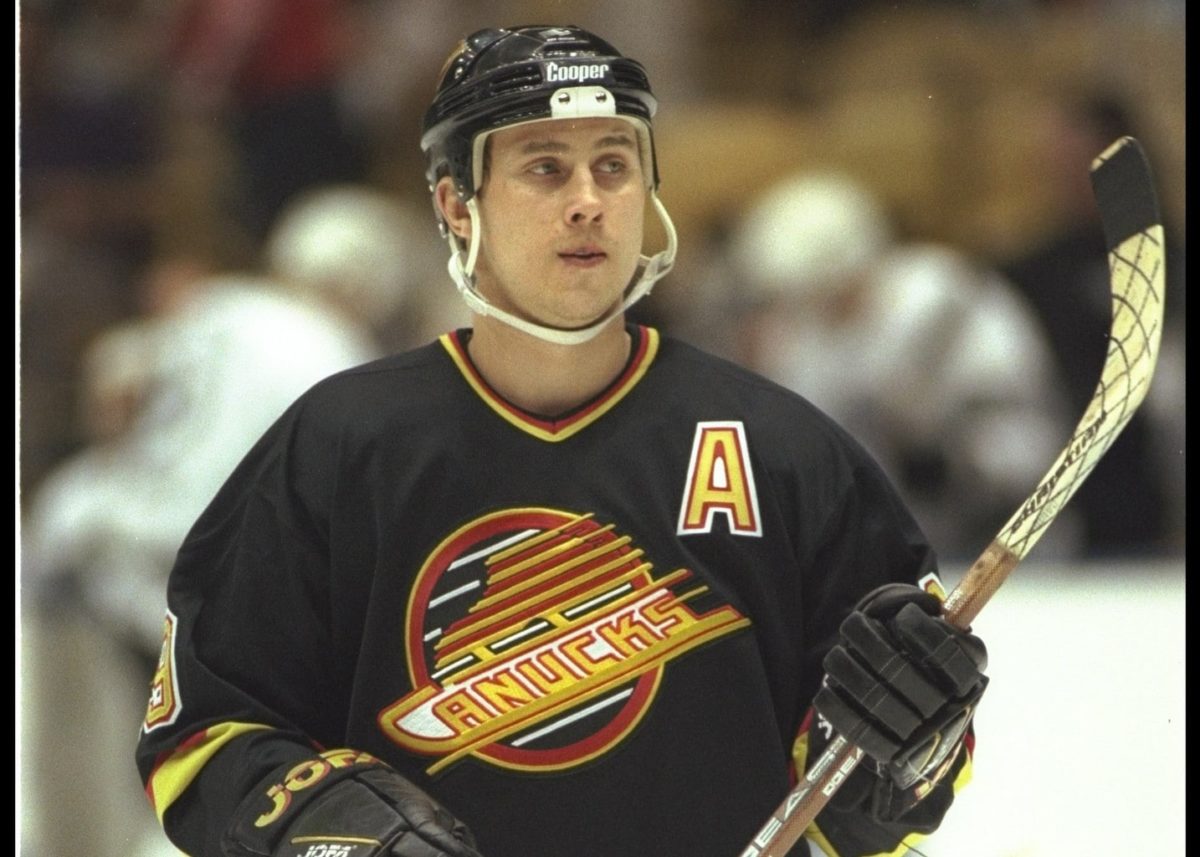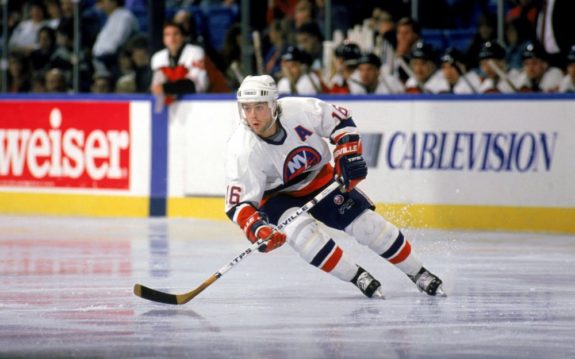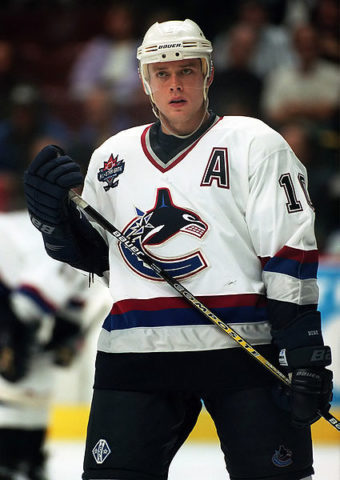Of all the great players to dazzle the NHL, some of the finest and most controversial have emanated from Mother Russia. From Sergei Fedorov to Sergei Bobrovsky, Pavel Bure to Pavel Datsyuk, Russia continues to produce some of the NHL’s top stars. And there are few who inspired more awe and ire than Alexander Mogilny.
Who was Alexander Mogilny?
Dubbed “Alexander The Great” at a young age, Mogilny made a name for himself playing on a line with the aforementioned Fedorov and Bure for the Soviet Union. His play would earn him “Best Forward” at the 1988 World Junior Championships, where the team won silver. That June, he was selected with the 89th overall pick by the Buffalo Sabres.

Tensions began to rise for him in 1989 and, during that year’s World Junior Championships in Stockholm, he literally disappeared into the night, defecting for North America and the National Hockey League with help from Sabres officials.
Sign up for our NHL History Substack newsletter
His defection caused a stir in the hockey world. Some worried that it would affect relations with Russian hockey but, ultimately, Mogilny became a pioneer. His leaving would loosen the reigns and Russia began letting younger stars leave for the NHL, Bure and Fedorov included.
Mogilny on his defection:
“Today I feel nothing but happiness,” he said shortly after defecting. “Perhaps this season was a rough one for me. I wouldn’t wish what I went through on my worst enemy. The conflict with the players cost me a lot. I’m not made of steel, you know”
When he arrived, Mogilny wore #89. Why? Well he had his reasons:
“Buffalo Sabres owner Seymour H. Knox gave me sweater number 89 when I joined his team. I was the 89th pick in the draft, and I came to North America in 1989. Wearing 89 on my back is special to me; it’s more than just a number.”
Alexander Moligny in the NHL
During his first three years in Buffalo, Mogilny would gradually improve, making a name for himself as a dangerous offensive player. After potting 15 goals and 43 points his rookie year, he would improve to 30 goals and 64 assists in his second, and 39 goals with 84 helpers in his third.
His play wasn’t the only thing being talked about, either. He developed a reputation for “not caring” during his first few seasons, as he would disappear for long stretches when he wasn’t lighting up the score sheet.
Not only that but his relationship with the local media could be described as “frigid”. Overcoming the language barrier was an obvious issue for Mogilny then, but he was never one to shy away from speaking his mind. In a time when players were trained since juniors to give mindless, bland answers, Mogilny stood out like a sore thumb.
By the time 1992-93 rolled around, Mogilny’s doubters were beginning to quiet. That year, the Sabres traded star center Pierre Turgeon to the New York Islanders for Pat Lafontaine. To say that Mogilny and LaFontaine “clicked” would be an understatement.

LaFontaine, picking up 95 assists and 148 points, finished second in scoring that year. As for Mogilny? He and rookie Teemu Selanne became members of an exclusive club: along with Mario Lemieux, Wayne Gretzky (twice), Brett Hull, and Phil Esposito, they would become just the fifth and sixth members of the 76+ goal club. Mogilny’s 127 points would also be good enough for seventh in the league.
Alexander Mogilny, Star in His Own Right
Unfortunately for both Mogilny and the Sabres, that level of success wouldn’t replicate itself the following year. LaFontaine would battle injuries, seeing the ice for just 16 games. Mogilny still put up his share of points — 79 in 66 games — but the sharp dropoff and the disappointing season for the Sabres was still blindingly apparent.
In a rebuilding phase and not wanting to shell out the big bucks Mogilny was earning at the time, the Sabres dealt him to Vancouver for young center Michael Peca, defenseman Mike Wilson, and a first-round pick (used on defenseman Jay McKee). At the time of the deal, it was seen as a landslide win for the Canucks, who would be pairing Mogilny with his former Soviet teammate Bure.

Despite Bure missing 1995-96 due to injury, Mogilny was extremely productive. His 55 goals and 107 points, despite the disappointing season for the team, showed that he could be a productive star without LaFontaine or Bure.
But, with the return of Bure, diminishing ice time, and questions at center, Mogilny wouldn’t be able to match his first year in Vancouver. Injuries and inconsistency set in and at the trading deadline in 2000, he was traded to New Jersey for Brendan Morrison and Denis Pederson.
The trade ended up working out for Mogilny and the Devils as they would go on to win the 2000 Stanley Cup, Mogilny’s first. He would follow that up with his best season since 1995-96, potting 43 goals and 83 points.
His play was good enough to earn a four-year, $22 million deal from the Toronto Maple Leafs before the 2001 season and, though injuries hampered him, he performed well. His second year, he would finish in the top 15 in league scoring with 79 points and earned his first piece of individual hardware: the 2002-03 Lady Byng.
A major hip injury would limit him to just 37 games in 2003-04, but there was a bright spot: he became just the second Russian-born NHL player to reach 1,000 career points.
Alexander Mogilny’s NHL Career Winds Down
The NHL would lock out its players for the entirety of the 2004-05 season, and when they returned, Mogilny would re-sign with the Devils. He never managed to shake the injury bug and would ultimately be placed on waivers before officially retiring at the end of the 2005-06 season.
Mogilny provided a lot of firsts during his career: the first Russian player to defect from the Soviet Union, the first non-North American to lead the NHL in goals (with Selanne) and the first Russian named to the NHL All-Star Team (1992). He would finish his career second among Russian-born players in scoring to former linemate Sergei Fedorov.
Since retiring, the six-time NHL All-Star has been vice president of the Kontinental Hockey League, managing the league’s relationship with the NHL among other duties.
“Alexander The Great” will go down as a pioneer, a disappointment, a Sabres legend, and a “What If?” But when anyone puts together a list of the greatest Russians to play the game, they’ll have a hard time leaving him off.
This article was originally published in March, 2015.
